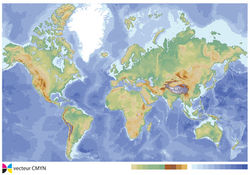Intensification of exchanges
ComplianceTech®

The intensification of the exchanges around the planet is distinguished from globalization in that the first phenomenon refers to the acceleration of economic exchanges without being confused with the disappearance of the space and time of the combined mechanisms of finance and digital, which is expressed by the term "Globalization".
In its strict and classical sense of intensification of exchanges around the globe, globalization ("mondialisation" in French) is not a new phenomenon; it has simply taken on a new dimension: globalization is an intensification of trade in goods and people. It is not a disappearance of circulations, encounters and exchanges, which on the contrary constitutes "globalization,, in the new sense of the term.
Free world trade presupposes that borders can not be opposed to the movement of goods and the World Trade Organization (WTO) has been set up for this purpose, the Marrakesh Accords of 1994 conferring on this organization a very great power , Since two conflicting states have their own disputes settled by a dispute settlement body whose report is endorsed by the WTO itself. The State whose enterprises have been the victim of an illegitimate tariff or non-tariff barrier, can itself inflict retaliatory measures on the guilty state by a kind of private justice. The WTO mechanism is concerned with goods and not with financial mechanisms, which do not even need to remove borders and other barriers, since their immateriality has already destroyed the limits and is thus a matter of "globalization", in the second and new sense of this term.
Globalization, in its strict sense of intensification of exchanges, is thus establishing market law on a global scale, even though this system has not yet become legalized to the point of establishing a global Competition Law as such, since the absence of a barrier to entry is just the first principle of this Law. But there is also no Regulation, that is to say that for the time being, the principle of free adjustment of supply - even foreign suppliers - and the demand of domestic consumers is not in balance with other principles, such as public service, risk prevention, preservation of common goods, etc.
So we are still waiting, not only in the political sense but also in the technical sense, for the establishment of the Regulation of Globalization, in both senses of this term. This is particularly needed in environmental regulation, as the outline of a global environmental organization has not flourished. It is feared that what is called "regulation of globalization", that is to say, such a balance, does not come from the public authorities alone, for lack of a global Public international public order sufficiently powerful and coherent. But it could come from the crucial global operators, through the mechanisms of compliance and social responsibility.
comments are disabled for this article